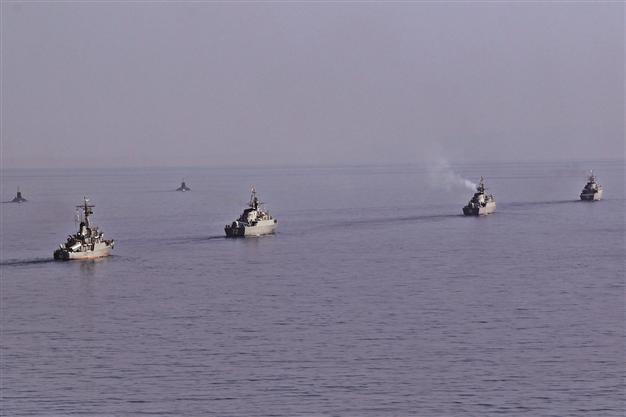Iran claims oil route to European markets
DUBAI

Iran navy vessels and submarines take part in a navy parade in the Oman Sea near the Strait of Hormuz.
Iran has reached agreements with European refiners to sell some of its oil through a private consortium, an official said over the weekend, a move designed to circumvent sanctions intended to put pressure on Tehran to halt its disputed nuclear program.The head of the oil products exporters’ union said the agreement between the exporters’ union, Iran’s central bank, and the oil ministry would get round a European Union ban on shipping insurance for tankers carrying Iranian oil, though he gave few details and did not name the refiners involved.
The EU put into effect a ban on the importation, purchase, or shipping of Iranian oil on July 1, and the Islamic Republic will see its oil exports fall by more than 50 percent this month from last year’s regular levels, costing it billions of dollars a month in revenue.
“There have been discussions with European refiners, and a final agreement has even been reached,” said Hassan Khosrojerdi, the exporters’ union head, according to Iran’s Mehr News Agency.
“In accordance with the agreement, it is planned that 20 percent of Iran’s oil exports will go through this private consortium.”
He added: “It is likely that because of international restrictions, we will give minor privileges or discounts to some of the buyers of our oil.”
Khosrojerdi did not say which refiners were involved or how they would receive the oil. Asked what steps had been taken to circumvent the shipping insurance ban, he said only “With the agreement with some of the European refiners, this problem has been solved completely.”
Iran’s oil ministry authorized the private export of Iranian oil in May, the Iranian Student News Agency reported at the time.
Historically, Iran’s National Iranian Oil Company (NIOC) was solely responsible for the sale and marketing of Iran’s crude.
Europe, Iran’s top market
Before the EU embargo, Iran sold about one fifth of its crude to Europe. EU sanctions targeting insurance have severely disrupted Iran’s oil sales to Asia as well, and Japan, one of Iran’s top buyers, will import no Iranian crude in July.
Meanwhile, the Islamic republic will close the strategic Strait of Hormuz at the entrance to the oil-rich Gulf only if its crude revenues are seriously threatened, its top military commander has said.
“We have plans to close the Strait of Hormuz because military commanders must have plans for any situation,” armed forces chief of staff General Hassan Firouzabadi said late on July 6, according to ISNA news agency.
“But Iran, acting rationally, will not close the corridor through which 40 percent of the world’s energy passes, unless its interests are in serious trouble,” he said, referring to the country’s crucial crude revenues.
Several commanders and officials have vowed that Iran reserves as an option closing the strait -- a strategic choke point for much of the Middle East’s oil -- if its nuclear facilities are targeted by military strikes.
The threats, renewed repeatedly since December, have generated warnings from the United States, which says any attempt by Iran to close the waterway is a “red line” that would trigger a U.S. military reaction.
















